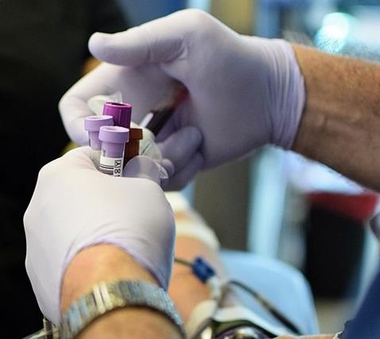FDA panel wary of lifting ban on gay blood donors

Washington (AP) — Government health advisers have concerns about lifting the nation's 31-year-old ban on blood donations from gay and bisexual men, despite growing pressure from gay rights advocates, medical experts and blood banks.
The ban dates from the first years of the AIDS crisis and was intended to protect the U.S. blood supply from exposure to the little-understood disease. But many medical groups, including the American Medical Association, say the policy is no longer supported by science, given advances in HIV testing. And gay activists say the lifetime ban is discriminatory and perpetuates negative stereotypes against homosexual men.
Despite such concerns, blood safety experts on Tuesday urged the Food and Drug Administration to exercise caution in making any changes to current policy, saying the impact on the blood supply is difficult to predict. The FDA is not required to follow the recommendations of its advisers. The agency has not set a timeline for making any changes to current donor standards.
The hesitancy voiced by FDA's advisers is out of step with other parts of the federal government, which have been steadily moving toward reconsidering the policy.
Last month a separate panel of blood safety experts convened by Department of Health and Human Services voted 16-2 in favor of doing away with the ban on donations from gay and bisexual men. The same experts previously voted to uphold the ban in 2010, but said new research shows that the safety of the blood supply would not be compromised by revising the donation policy.
The panel recommended moving to a one-year deferral period, which would bar male donors who have had sex with men in the previous 12 months.
But the FDA's experts did not overwhelmingly embrace that proposal.
"If I look at the science I would be very wary of a one-year deferral," said Dr. Susan Leitman. "It sounds to me like we're talking about policy and civil rights rather than our primary duty, which is transfusion safety."
Most members of the 22-member panel agreed that more robust screening technology is needed to analyze the national blood supply and gauge safety changes over time. But panelists said it's difficult to predict the impact of doing away with the current donor restrictions.
"It's going to be a guess as to what's going to happen," said Dr. James Allen. "And it's going to take time before we get the data that shows us whether that was a good decision or not."
Currently all blood donations are screened for HIV, however the test only detects the virus after it's been in the bloodstream about 10 days.
According to government figures, men who have had sex with other men represent about 2 percent of the U.S. population, yet account for at least 62 percent of all new HIV infections in the U.S.
Moving to a policy that only bars donations from men who have had gay sex in the past year would put the U.S. in-line with other countries, including Australia, Japan and the U.K. Canada recently moved to a five-year ban for men who have had sex with another man.
But gay rights activists said Tuesday that those policies are unrealistic.
"For the overwhelming majority of men, a donation policy which requires 12 months of abstinence is a de facto lifetime ban," said Jason Cianciotto, of the Gay Men's Health Crisis, a New York-based nonprofit that supports AIDS prevention and care. "Do you require heterosexuals to be abstinent for one year?"
Speakers from the Human Rights Campaign and other gay rights groups said that restrictions should apply equally to all potential donors who engage in risky behaviors, regardless of sexual orientation. Under current screening guidelines, people who have had sex with a prostitute can still donate blood provided more than a year has passed.
The FDA implemented the ban in 1983, when health officials were first recognizing the risk of contracting AIDS via blood transfusions. Under the policy, blood donations are barred from any man who has had sex with another man at any time since 1977 — the start of the AIDS epidemic in the U.S.
The push for changing the policy gained momentum in 2006, when the Red Cross, the American Association of Blood Banks, and America's Blood Centers called the ban "medically and scientifically unwarranted." Last year the American Medical Association voted to oppose the policy.
Patient groups that rely on a safe blood supply, including the National Hemophilia Foundation, have also voiced support for dropping the ban.
By Matthew Perrone, AP Health Writer. Copyright 2014 The Associated Press. All rights reserved. This material may not be published, broadcast, rewritten or redistributed.
The Gayly – December 3, 2014 @ 9:20am





